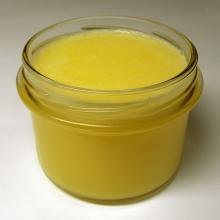Ghee is a class of clarified butter that originated in South Asia and is commonly used in South Asian (Indian, Bangladeshi, Nepali, Pakistani, and Iranian cuisine) cuisine and ritual.
Like any clarified butter, ghee is composed almost entirely of fat; the nutrition facts label found on bottled cow's ghee produced in the USA indicates 8 mg of cholesterol per teaspoon.
Studies on rats have shown that ghee helps to reduce serum cholesterol slightly but not significantly. Studies in Wistar rats have revealed one mechanism by which ghee reduces plasma LDL cholesterol. This action is mediated by an increased secretion of biliary lipids. Furthermore, ghee stimulates the secretion of gastric acid, thus aiding in the digestive process. As such ghee is used to treat constipation and ulcers in Ayurveda.
Indian restaurants and some households may use partially hydrogenated vegetable oil (also known as vanaspati, dalda, or "vegetable ghee") in place of ghee because of its lower cost. This vegetable ghee may contain trans fat. Trans fats are said to cause serious health conditions. The term shuddh ghee, however, is not used in many regions as partially hydrogenated oils are marketed as pure ghee in some areas. In India, the sale of fake ghee is stopped by law enforcement agencies whenever a complaint is made. Ghee is also sometimes called desi (country-made) ghee or asli (genuine) ghee to distinguish it from vegetable ghee.


